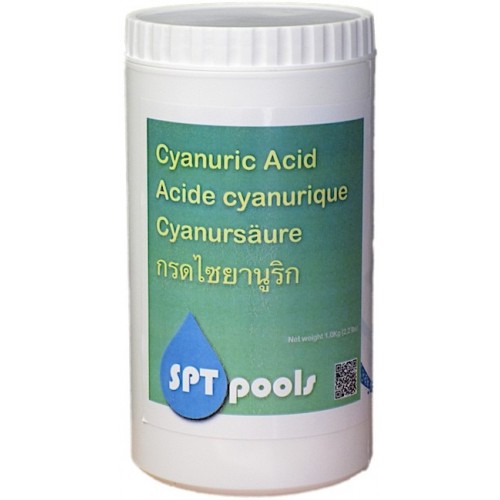- On sale!



Cyanuric Acid sun block chlorine stabiliser 1Kg. in resealable plastic container.
Essential when using salt water chlorination systems or liquid chlorine.
Instructions in English, French, German, Thai.
QR coded.
Cyanuric Acid (CYA)
Prevents 'burn off' by sunlight of non-stabilised chlorine in swimming pools. It binds to free chlorine and releases it slowly, extending the time needed to deplete each dose of sanitizer. Particularly effective in pools equipped with salt water chlorination systems. Not needed for indoor pools.
For pools with saltwater chlorinators, the best results are obtained at a pH of 7.2.
Recommended maximum concentration of CYA: 50 ppm
YOU ONLY NEED VERY SMALL QUANTITIES OF CYA.
As a rough guide, For a 200,000 litre (200m3) pool, for example a pool 10 x 20 metres, 6 Kg of CYA would be sufficient to raise the CYA level from 0 to 50 ppm. CYA does not get used up - its only loss is through backwashing and heavy dilution of the water from rain, and topping up.
A meduim sized domestic pool of around 4 x 10m, average depth 1m, and using a salt water chlorinator, would need only 1 Kg of CYA to raise the CYA from 0 - 30ppm. Regular maintenance reequires only a tiny fraction of this amount.
Q: Do I need cyanuric acid?
A. Short answer: If your pool is outside and if you use a salt water chlorinator, YES, you do.
Generally, most chlorine products for pools are marketed as T.C.C.A (trichlorisocyanuric acid), that is, they already contain Cyanuric Acid. While this is true for chlorine powder, granules and tablets, saltwater chlorination systems DO NOT produce cyanuric acid and to reduce the load on a chlorinator it should be used. Here in the tropics, however, the sun is very fierce, and in many situations, many pools may benefit from careful addition of Cyanuric Acid.
Q: What does cyanuric acid do?
A: Cyanuric acid forms a weak bond with free chlorine in the pool water, protecting it from the sun’s ultraviolet rays to reduce chlorine loss. Properly managed, cyanuric acid has been shown to reduce the amount of chlorine needed to maintain the minimum chlorine residual in an outdoor pool. In a small pool with a moderate bather load, cyanuric acid can significantly reduce the cost for chemical disinfection.
Q: How much cyanuric acid should be used in a swimming pool?
A: Chemical suppliers recommend that the optimal range for cyanuric acid is 30-50 ppm. Other sources recommend about 20 ppm for a good cost- to-benefit ratio. At levels above 50 ppm, pools reach the point of diminishing returns where the reduction in chlorine effectiveness and cost of buying cyanuric acid outweighs the benefits.
Q: How does one test for cyanuric acid?
A: Any pool operator who uses cyanuric acid or stabilized chlorine should purchase a test kit capable of measuring cyanuric acid and understand how to use it properly. Cyanuric acid level should be tested at least once a week.
Factors Affecting the Cyanuric Acid Concentration in Swimming Pools (PDF dowload)
For a more simple explanation:

 Watch how it works
Watch how it works